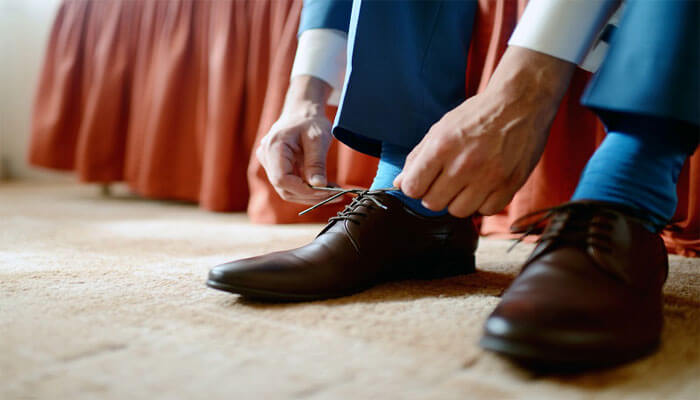Hello fellow readers. Today we are going to talk about some habits of the Portuguese people and explain why they do it.
They do not take their shoes off

In many countries, especially in countries where it snows in the winter, it can be very disrespectful to enter in someone’s house and do not take off the shoes.
When it snows, in some parts of the streets the ice melts and mix with the dirt. Consequently, the shoes will become dirty and if the host has a carpet, this can become a nightmare. Therefore, taking off your shoes means that you’re respecting the host and the rules of hygiene.
No! Portuguese people are not dirty! However in Portugal there’s no snow in the streets and usually no carpets in the houses. Houseplants are usually quick to clean so it is easier to clean them more often than to continually try not to dirty them.
Taking off your shoes is one thing that the Portuguese only do at their homes to make themselves feel more comfortable. Consequently, doing this in someone else’s home means pretending that this is our home, which looks a bit disrespectful.
Anyway, if for you it is very important to take the shoes off, don’t be afraid of inviting your Portuguese friend to come over. Just ask politely if he doesn’t mind to take off his shoes and he will do it with pleasure. In the same way, Portuguese people like when others respect their rules, they also like to respect the rules of others.
They eat always at the same time
There are 2 main meals in Portugal: lunch and dinner. Therefore, breakfast isn’t very important because people usually don’t eat too much. Some people can just drink coffee. Usually lunch time takes place between 12.30 and 14.00, because at this time everyone is already hungry and can’t wait any longer.
This means if you go to a restaurant between 13.00 and 13.30, probably you will have to wait more than usual, because restaurants will be full of people. At the same time if you arrive before 12.00 or after 15.00, probably will not be food for you.
Dinner usually takes place between 19.30 and 21.00 and follows the same principles…
Coffee means espresso and money means cash
Almost everyone in Portugal drinks espresso (and only espresso). If you say that you’d like to have a coffee (= “café”, in Portuguese language), the waitress will bring you an espresso. Thus, if you want another kind of coffee, you have to let the waitress know it in advance.
Another interesting fact about “café”, is that the Portuguese word “café” means “coffee” and also “cafe”.
And when it comes to the bill, if someone asks you if you are going to pay with “money” (literally “dinheiro”, in Portuguese language), actually he is asking you if you are going to pay with “cash”. There’s a word for “cash” (“numerário”, in Portuguese language) but usually we only use it in more formal contexts.
Cold houses without furniture
The average winter temperature in Portugal is around 8-9ºC. Therefore, it is not necessary to worry about the cold and you can easily spend time outside. People don’t think too much about the cold because isn’t hard to deal with it.
Although, winter in Portugal is cold enough to make you desire to turn on the heating. In many countries, especially in those where it snows, the houses have central heating with turns on automatically when becomes cold.
In Portugal most of houses haven’t central heating and even when they have, you should turn it on by your own (and at your cost!). Commonly, people buy them own heating devices and they turn them on when they feel cold.
So, if you are going to live in Portugal, don’t expect that your home will be magically warm in winter: so be prepared!
In Portugal is common to rent apartments and houses without furniture, which can annoy foreigners (and locals). Firstly, check if everything is OK: heating and furniture!
Always paying for parking, but parking illegally sometimes
In Portugal is common to risk and park illegally, that is to park where is not allowed. Contrarily, if is legal but is necessary to pay, they pay. And that’s all about math…
If you park illegally, the police can fine you. The penalty can be quite expensive, but police officers have other things to do, so you have a good chance to have luck.
On the other hand, if you don’t pay for the parking, an officer of a parking company probably will fine you quickly. Actually, it is his job: check if everyone paid. Here the fine usually is lower, but the odds are higher, so is better do not take risks.
Anyway, these officers (not police) can also fine you when you park illegally. So, try to be on the right side!
They don’t write red
In primary school, teachers use red pens to correct errors and write marks and notes about students. So, students shouldn’t write in red, otherwise what teacher writes won’t be highlighted. If student do it, it won’t be polite.
People grow up, but the ideas remains: write in red to someone is not polite. So, it’s better to take another color.
Conclusion
This was the first part of “Facts about Portuguese People”. We focus on the contemporary and daily life aspects, because we think it is more interesting and useful.
You would like to know more? Please, give us your feedback bellow.
Also, if something looks strange or unusual in Portuguese habits and in Portugal, please let us know. We will be glad to discuss this with you.
Finally, don’t forget to follow us on Facebook and Instagram.
